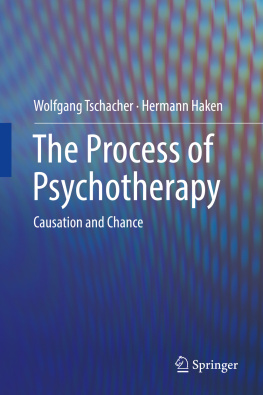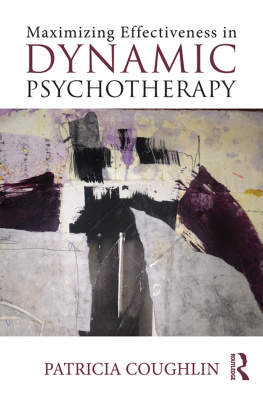Carsten Ren Jrgensen
The Psychotherapeutic Stance
Carsten Ren Jrgensen
Aarhus, Risskov/Skejby, Denmark
ISBN 978-3-030-20436-5 e-ISBN 978-3-030-20437-2
https://doi.org/10.1007/978-3-030-20437-2
Springer Nature Switzerland AG 2019
This work is subject to copyright. All rights are reserved by the Publisher, whether the whole or part of the material is concerned, specifically the rights of translation, reprinting, reuse of illustrations, recitation, broadcasting, reproduction on microfilms or in any other physical way, and transmission or information storage and retrieval, electronic adaptation, computer software, or by similar or dissimilar methodology now known or hereafter developed.
The use of general descriptive names, registered names, trademarks, service marks, etc. in this publication does not imply, even in the absence of a specific statement, that such names are exempt from the relevant protective laws and regulations and therefore free for general use.
The publisher, the authors and the editors are safe to assume that the advice and information in this book are believed to be true and accurate at the date of publication. Neither the publisher nor the authors or the editors give a warranty, expressed or implied, with respect to the material contained herein or for any errors or omissions that may have been made. The publisher remains neutral with regard to jurisdictional claims in published maps and institutional affiliations.
This Springer imprint is published by the registered company Springer Nature Switzerland AG
The registered company address is: Gewerbestrasse 11, 6330 Cham, Switzerland
To Vibeke, Mathilde and Johanne
To the anonymous patients who, despite their past experiences of severe betrayal and transgressions from others, have shown me so much trust by inviting me into their world, so that we could work together to enhance our shared psychological understanding and their quality of life.
This book has undergone a scientific review process, where two independent scholars have reviewed and commented on the authors manuscript.
Foreword
With foreword by Anthony Bateman
Psychotherapy works! This book outlines the evidence for this assertion and argues strongly that the therapeutic relationship and therapist attitude are key factors contributing to favourable outcomes from psychotherapy, which for many mental health conditions are better than medication. Whilst psychotherapists might cherish their techniques, name and protect their acronymic models of psychotherapy, and believe that their carefully crafted interventions are key to change, the author of this books argues that this misses the point. It is the relationship developed with the client that is the effector of change and not valued techniques. If this is the case it is important to know why this should be and what aspects of the relationship and the therapist are important. This is the subject of this book.
We know that there are good and bad therapists in terms of achieving satisfactory symptom relief and behavioural change for a patient. Yet we do not know which characteristics of a therapist are advantageous to which patient. Some therapists may be good at treating some types of patients and not others. An intriguing finding in a recent longitudinal analysis of clinical outcomes not only found that the therapist is the greatest source of variance in outcomes, but also reported that therapists effectiveness tends to diminish as their experience increases (Goldberg et al. 2016). The disparate and counter-intuitive range of findings in this area have contributed to a lively debate about the common factors of effective psychotherapy (Wampold and Imel 2015). So what are we to make of this? To explain the significance of the psychotherapeutic relationship and the absence of evidence about the importance of specific techniques in effecting change, it is necessary to go back to reconsider mental health/ill-health, reformulate psychotherapy itself, and understand the relationship between them. This is where the reader will be amply rewarded by reading this book. I will argue here that the central change process of psychotherapy for any individual with mental distress is the generation of a trust in the world, known as epistemic trust, which allows learning from others (Fonagy et al. 2015).
Mental ill-health is commonly considered as the presence of a pathological mental process. Yet it might equally be better conceptualised as the absence of a protective process, namely psychological resilience. The notion that psychopathology may arise from a loss of resilience has gained traction over the past few years. One proposed framework (Kalisch et al. 2015) describes resilience as a cognitive process. A potentially stressful stimulus is perceived and mentally represented by the individual. The mental representation is then appraised using higher-order cognition, and understood using a range of psychological mechanisms and phenomena, including executive function, attention, general intelligence, and self-awareness. The capacity for appraisal determines the emotional response of the individualthat is, their resilience. Thus, according to this formulation, resilience is the outcome of the top-down cognitive appraisal of a stressful stimulus. The external and social factors that have been associated with resilience such as social support or a secure attachment history affect resilience either directly or indirectly, in that they shape the individuals appraisal approach, or minimize exposure to stressors. This is not to deny the role of socio-environmental factors in determining an individuals resilience, or the importance of interventions at a social or community level; it is to suggest that the mechanism by which these social factors affect an individuals resilience is via their impact on the individuals appraisal style. The appropriate functioning of higher-order cognition crucially depends on appropriate judgements about social contexts. The mechanism effecting this judgement is known as mentalizing .
Psychotherapy can be conceptualised as an organised, structured social interaction which generates an attachment interaction based on reciprocal attachment patterns of the patient and therapist. Treatment requires participants to understand the mental states of each other and gradually recognise how mis-understanding mental states in oneself and others impacts on interpersonal interaction and may lead to symptoms. An essential component of this process is mentalizing.
Mentalizing describes a particular facet of the human imagination: an awareness of mental states in oneself and in other people, particularly in explaining their actions. It involves perceiving and interpreting the feelings, thoughts, beliefs, and wishes that explain what people do. This entails an awareness of someones circumstances, their prior patterns of behavior, and the experiences to which the individual has been exposed. The emphasis on imagination and the inherent lack of certainty in relation to mental states leads to one of the ideas underpinning a mentalizing clinical approach: an inquisitive stance . The inquisitive stance is a style of interaction characterized by an expectation that ones mind may be influenced, surprised, changed, and enlightened by learning about anothers mind. To some extent, this is a common component of all psychotherapy and may be part of how the therapeutic relationship brings about change (Bateman and Fonagy 2016). Mentalizing is the interpersonal workhorse of the social imagination: it is the aspect of social cognition that enables us to make sense of the behavior of ourselves and others, making cooperative and adaptive interaction possible. Failures in mentalizing will lead to a loss of resilience, that is a reduction in the appraisal capacities of the individual, with the inevitable consequences for mental well-being; contrariwise, enhancing mentalizing through psychotherapy will reinstate mental equilibrium.










